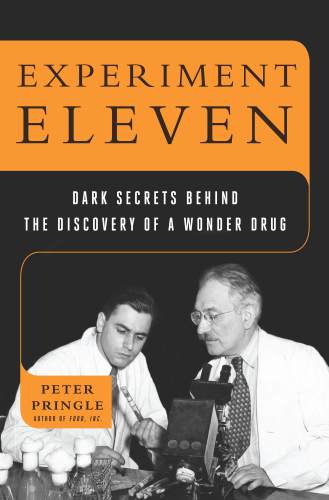
Experiment Eleven
Dark Secrets Behind the Discovery of a Wonder Drug
- اطلاعات
- نقد و بررسی
- دیدگاه کاربران
نقد و بررسی

March 5, 2012
The rift between eminent microbiologist Selman Waksman and his brilliant graduate student Albert Schatz was a spectacular fallout in the annals of science. In this riveting history of the discovery of one of the most important drugs of the last century—streptomycin, the first antibiotic effective against tuberculosis—journalist Pringle (Food, Inc.) argues that the story of the co-discoverers of the antibiotic is a fascinating human as well as scientific drama. Pringle not only recaps the split between the Rutgers researchers but the part played by the pharmaceutical giant Merck, which Waksman consulted for and which filed the scientists’ patent application and then leased the rights from Rutgers to make the drug. Streptomycin led to countless happy endings, not least for Waksman, who claimed the spotlight for himself, leaving Schatz ignored and bitter. When Waksman worked out a deal to reap 20% of Rutgers’s take of the royalties, Schatz turned to the courts to reclaim his co-inventor status. Pringle skillfully relates an important tale of a life-saving scientific discovery tarnished by egotism and injustice.

March 1, 2012
Pringle (The Murder of Nikolai Vavilov, 2008, etc.) tells a complex tale of scientific intrigue. The stage was set in 1943, when the future Nobel Laureate Selman Waksman headed the Department of Soil Microbiology at Rutgers University and President Roosevelt launched a major initiative to identify and develop antibiotics to treat animals and humans and to deal with the potential threat of biological warfare. Among the graduate students in the department was Albert Schatz, who was analyzing soil samples in an attempt to find an antibiotic that would cure tuberculosis. In his 11th experiment he succeeded, isolating two strains of a microbe--one from a soil sample and the other from a throat culture taken from a chicken's throat--given to him by a fellow graduate student. In fact, he had discovered the drug later to be named Streptomycin. Pringle gives a fascinating account of the steps on the road to turning it into a pharmaceutical--determining its effectiveness, testing for toxicity and side-effects, etc. Although the first announcement of the discovery was made jointly by the professor and his graduate student, Waksman began taking sole credit, pressuring Schatz into relinquishing patent rights to Rutgers and hiding the fact that he was being paid a significant percentage of the royalties. Ultimately, Schatz sued Waksman, and an out-of-court financial settlement was reached. Though it acknowledged Schatz's part in the discovery, Waksman's reputation and prestige remained intact and he alone was awarded a Nobel Prize. A gripping account of academic politics and the birth of the pharmaceutical industry.
COPYRIGHT(2012) Kirkus Reviews, ALL RIGHTS RESERVED.

April 15, 2012
British journalist Pringle (Food, Inc.) uncovers the drama behind the incredible discovery of wonder drug streptomycin--the first effective cure for tuberculosis. As a young graduate student at Rutgers University, Albert Schatz chanced upon the microbe later known as streptomycin. Sadly, this early triumph also proved to be the pinnacle of Schatz's career, as he had the great misfortune of working under microbiologist Selman Waksman, an ambitious, self-aggrandizing individual who eventually claimed exclusive discovery of the drug and won the Nobel Prize. Also, unbeknown to Schatz, Waksman was profiting financially from his dealings with Merck, the drug's manufacturer. When Schatz belatedly discovered that Waksman had claimed all of the credit, he asserted his rights, which led to virtual career suicide as the influential Waksman blackballed him at every turn. Schatz sued Waksman and was finally recognized as the codiscoverer of streptomycin. VERDICT A riveting narrative for readers interested in scientific discovery and those who enjoy books such as Paul de Kruif's Microbe Hunters.--Lynne F. Maxwell, Villanova Univ. Sch. of Law Lib., PA
Copyright 2012 Library Journal, LLC Used with permission.




دیدگاه کاربران